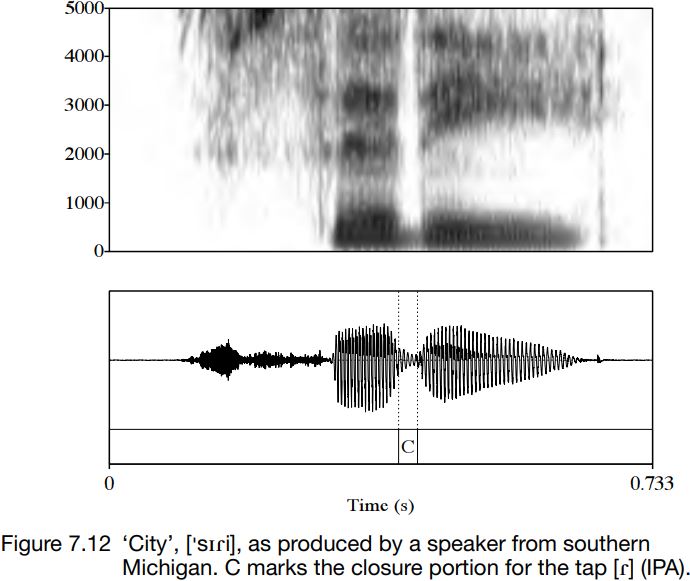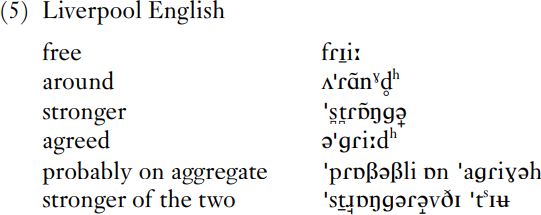


 Grammar
Grammar
 Tenses
Tenses
 Present
Present
 Past
Past
 Future
Future
 Parts Of Speech
Parts Of Speech
 Nouns
Nouns
 Verbs
Verbs
 Adverbs
Adverbs
 Adjectives
Adjectives
 Pronouns
Pronouns
 Pre Position
Pre Position
 Preposition by function
Preposition by function 
 Preposition by construction
Preposition by construction
 Conjunctions
Conjunctions
 Interjections
Interjections
 Grammar Rules
Grammar Rules
 Linguistics
Linguistics
 Semantics
Semantics
 Pragmatics
Pragmatics
 Reading Comprehension
Reading Comprehension|
Read More
Date: 2023-08-14
Date: 2023-12-13
Date: 2023-05-31
|
Taps are stop articulations, but unlike plosives, the closure for a tap is non-maintainable. For taps, the closure is made by two articulators when one articulator – usually the front of the tongue – strikes another in passing. The closure lasts for about 30–40 ms. Because the active articulator is in motion, the closure cannot be maintained.
Taps occur very commonly all over the English-speaking world as forms of [t] and [d] between vowels. The cluster [nt] is sometimes produced with a nasalized tap  , so that e.g. ‘winter’ can be pronounced
, so that e.g. ‘winter’ can be pronounced  . Taps are especially common in many varieties of American English, but are by no means limited to those varieties.
. Taps are especially common in many varieties of American English, but are by no means limited to those varieties.
Figure 7.12 shows a production of the word ‘city’,  , by a speaker from southern Michigan. The portion labelled C corresponds to the short closure period characteristic of taps. Notice how short it is (about 25 ms). It is voiced all the way through. Immediately after the labelled portion there is a transient which corresponds to the release of the tongue.
, by a speaker from southern Michigan. The portion labelled C corresponds to the short closure period characteristic of taps. Notice how short it is (about 25 ms). It is voiced all the way through. Immediately after the labelled portion there is a transient which corresponds to the release of the tongue.
There are many pairs of words distinguished by [t] and [d] which sound very alike or even identical when pronounced with taps: ‘writer’ and ‘rider’ ( ) are well-known cases. Sometimes, however, the distinction is still made through e.g. vowel duration (longer duration in [t/ɾ] words) and vowel quality (for example, Canadian speakers use
) are well-known cases. Sometimes, however, the distinction is still made through e.g. vowel duration (longer duration in [t/ɾ] words) and vowel quality (for example, Canadian speakers use  in ‘rider’, but
in ‘rider’, but  in ‘writer’). This loss of distinction between originally different words has given rise to some interesting ‘eggcorns’ – words which are misheard and then given peculiar spellings. (‘Eggcorn’ is an eggcorn from ‘acorn’.) Examples arising from confusion over [t/d] include: ‘Catillac’, ‘radify’, ‘color-coated’, and ‘don’t know X from atom’. (See eggcorns.lascribe.net for more.)
in ‘writer’). This loss of distinction between originally different words has given rise to some interesting ‘eggcorns’ – words which are misheard and then given peculiar spellings. (‘Eggcorn’ is an eggcorn from ‘acorn’.) Examples arising from confusion over [t/d] include: ‘Catillac’, ‘radify’, ‘color-coated’, and ‘don’t know X from atom’. (See eggcorns.lascribe.net for more.)
Here are some taps as produced by Anglo-English speakers in unscripted conversation in places where [t] might also be expected:
(4) VT 020104
a little bi[ɾ] of acid
I’ve go[ɾ]a go by my husband’s opinion

e[ɾ] it cool
I think I know wha[ɾ] i[ɾ] is
i[ɾ] is del:icious
Taps occur in conservative varieties of Anglo-English as one form of rhotic. They are commonly heard in old British black-and-white films where the actors speak RP. Taps also occur dialectally in England as tokens of rhotics, e.g. in many parts of Yorkshire and Liverpool. Many speakers who do not normally produce  as a tap use a voiceless tap in the cluster
as a tap use a voiceless tap in the cluster  , as in ‘three’.
, as in ‘three’.
Here are some narrow transcriptions of words with taps in Liverpool English (Scouse) (Watson 2007). Scouse is known for its open articulations, of which there are many here, including aspiration for [d] in ‘around’.

|
|
|
|
علامات بسيطة في جسدك قد تنذر بمرض "قاتل"
|
|
|
|
|
|
|
أول صور ثلاثية الأبعاد للغدة الزعترية البشرية
|
|
|
|
|
|
|
مكتبة أمّ البنين النسويّة تصدر العدد 212 من مجلّة رياض الزهراء (عليها السلام)
|
|
|